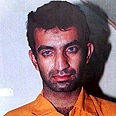
WASHINGTON - Ramzi Yousef, an al-Qaeda terrorist who was convicted in the 1993 bombing of the World Trade Center, asked a US appeals court to release him from solitary confinement and allow him to serve his sentence in a more open prison environment.
Yousef, 44, was sentenced to life imprisonment with no parole, plus 240 years, and has not expressed any regret for his responsibility for the death of six people and the injury of over 1,000 people.
Related stories:
- US takes war on al-Qaeda to N. Africa
- Al-Qaeda: We kidnapped Jewish aid worker in Pakistan
- Connecting the dots
For 18 years, the top al-Qaeda operative has been confined to a 2 by 3.5 meter cell (7 by 11 feet). Every day he is locked behind steel doors for nearly 24 hours, not making contact with even the guards who hand him his food, as they do so through a sally port between the doors.
After the attack, Yousef fled to Pakistan, where he was later arrested by FBI agents. In his New York trial, he took pride in his actions, saying "Yes, I am a terrorist, and proud of it as long as it is against the US government and against Israel, because you are more than terrorists; you are the ones who invented terrorism and using it every day. You are butchers, liars and hypocrites."
He was then taken to the federal Supermax penitentiary, one of the most isolated prisons in the US, located in the Colorado Rockies.
In October, US District Court Judge Kevin Thomas Duffy of New York wrote a memo, in which he stated that "Ramzi Yousef is a cold-blooded killer, completely devoid of conscience."
The terrorist nonetheless filed a petition asking a federal judge to release him from solitary confinement, citing "good behavior."
"I request an immediate end to my solitary confinement and ask to be in a unit in an open prison environment, where inmates are allowed outside their cells for no less than 14 hours a day," Yousef wrote to the Supermax warden, The Los Angeles Times reported, according to confidential government records that the paper obtained.
Bernard V. Kleinman, Yousef's lawyer, said in an interview that the convicted terrorist already "demonstrates a degree of paranoia and a degree of fear that would not be normal or expected if he was in the general population or had more contact with other inmates."
Though the prison warden argues that Yousef still poses a serious security threat, some criminal law experts agree with the prisoner that his treatment is unconstitutional.
- Receive Ynetnews updates
directly to your desktop















